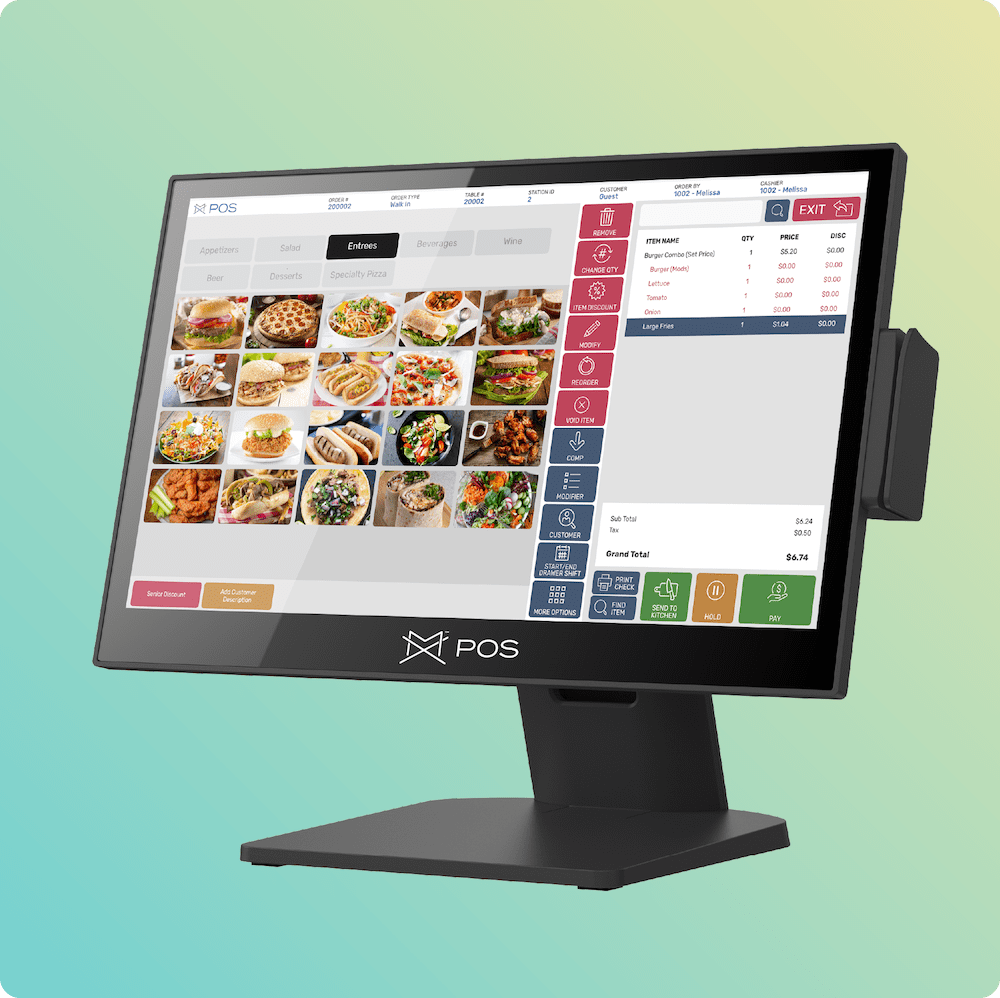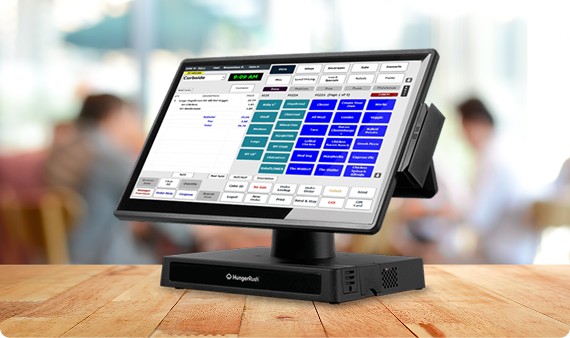How to choose the best-suited Restaurant POS Software for your foodservice establishment
Understanding the Importance of POS Software in Modern Retail Workflow
In today's retail landscape, the duty of POS software has come to be progressively considerable. These systems have transformed from standard money registers to multifaceted devices that boost various elements of operations. They not just enhance purchases yet also provide insights that can shape company methods. Comprehending exactly how these systems influence consumer experience and supply monitoring is vital for any kind of retailer seeking to remain competitive. The effects of these developments necessitate further exploration.
The Development of POS Software: From Purchase Processing to Comprehensive Solutions

Enhancing Consumer Experience Via Advanced POS Includes

Improving Stock Administration With Integrated POS Systems
Integrated POS systems play an important role in streamlining supply management by automating procedures that commonly needed significant hand-operated effort. These systems make it possible for retailers to track stock degrees in actual time, eliminating discrepancies that often emerge from hands-on supply counts. With features such as barcode scanning and automated stock replenishment alerts, organizations can preserve suitable supply levels without overstocking or stockouts.Furthermore, integrated POS systems help with exact forecasting by analyzing historical sales information, enabling retailers to make informed getting decisions. This predictive capacity assists services adapt to changing consumer demands and seasonal patterns extra effectively.Additionally, the centralization of stock data throughout numerous sales networks enhances presence, making it possible for stores to manage their supply a lot more successfully. Inevitably, the assimilation of POS systems into inventory administration simplifies operations, lowers human error, and adds to boosted success.
Real-Time Sales Tracking and Reporting for Informed Decision-Making

Precise inventory management lays the groundwork for efficient sales tracking and coverage. Real-time sales tracking makes it possible for sellers to check sales efficiency as it takes place, offering instant insights into customer getting patterns and fads. This capacity permits businesses to respond quickly to variations sought after, optimizing stock levels and reducing overstock or stockouts.Moreover, integrated POS systems promote the generation of detailed records, highlighting vital metrics such as sales by category, amount of time, and specific products. Such coverage capabilities equip stores to make data-driven choices, identifying successful methods and areas needing renovation.
The Role of POS Software in Customer Partnership Monitoring
POS software plays a vital duty in improving client relationship monitoring by enabling merchants to execute individualized marketing strategies. By evaluating client data, organizations can tailor promotions and communications to meet specific preferences. Additionally, these systems assist in the growth of improved commitment programs that encourage repeat business and enhance customer involvement.
Personalized Advertising And Marketing Approaches
As sellers significantly look for to enhance customer loyalty and involvement, individualized marketing approaches have actually arised as an important part of effective customer connection monitoring. POS software plays a crucial duty in this process by gathering and assessing consumer data, enabling sellers to tailor advertising and marketing efforts to private preferences and buying habits. By leveraging understandings from acquisition backgrounds, sellers can produce targeted promos and this article customized interactions that resonate with consumers, promoting a deeper connection. In addition, the combination of POS software with client connection management systems permits for seamless monitoring of consumer communications, guaranteeing that advertising and marketing techniques remain appropriate and timely (Restaurant POS Software). This data-driven approach not just boosts customer complete satisfaction but also drives sales and encourages repeat company, solidifying the seller's market setting
Boosted Commitment Programs
Retailers are increasingly identifying the value of loyalty programs in fostering long-lasting consumer partnerships and enhancing general interaction. POS software plays a necessary function in the advancement and monitoring of these programs, allowing merchants to track consumer acquisitions, preferences, and actions successfully. By leveraging information analytics, businesses can develop individualized benefits and incentives that reverberate with private consumers, consequently raising participation in commitment programs. Furthermore, POS systems enable seamless combination with mobile applications and digital platforms, facilitating simple access to benefits and promotions. This not just enhances customer contentment yet likewise drives repeat service. Ultimately, POS software equips sellers to grow much deeper links with their clients, changing periodic customers right into dedicated patrons with targeted and significant engagement approaches.
Incorporating POS Systems With Ecommerce Platforms for Omnichannel Success
To accomplish real omnichannel success, seamless integration between point-of-sale (POS) systems and e-commerce platforms is necessary. This combination enables merchants to merge their inventory management, guaranteeing that product accessibility is accurately shown throughout both online and physical shops. Clients take advantage of a cohesive buying experience, where they can easily change in between networks without running into discrepancies.Furthermore, integrated systems assist in real-time data sharing, making it possible for businesses to examine client actions and preferences a lot more properly. This data-driven approach permits stores to customize advertising approaches and maximize stock degrees, eventually enhancing consumer fulfillment and driving sales.Additionally, the ability to process transactions throughout systems streamlines operations, minimizing the threat of mistakes and improving overall effectiveness. As stores significantly adopt omnichannel strategies, more info here the combination of POS systems with ecommerce platforms remains a crucial variable in accomplishing lasting growth and maintaining affordable benefit in the dynamic retail landscape.
Future Fads in POS Innovation and Their Influence on Retail Workflow
As retail procedures progress, future trends in POS modern technology are established to reshape the landscape substantially. The rise of cloud-based services, technologies in mobile POS systems, and the advantages of AI integration are amongst the key developments prepared for to boost effectiveness and consumer experience. These innovations guarantee to improve processes and cultivate an extra vibrant retail setting.
Cloud-Based Solutions Increase
With the increasing dependence on modern technology, cloud-based POS services are changing retail procedures by providing enhanced flexibility and scalability. These systems allow sellers to gain access to real-time information from anywhere, facilitating better decision-making and customer care. By leveraging cloud facilities, services can reduce upfront costs connected with software and hardware installations while guaranteeing smooth updates and upkeep. Additionally, cloud-based options sustain multi-location monitoring, permitting sellers to integrate stock and sales across various electrical outlets effortlessly. This flexibility is important in today's busy market, where consumer preferences shift rapidly. As more sellers take on these services, they can expect enhanced operational efficiency and a more responsive method to market demands, eventually enhancing customer contentment and commitment.
Mobile POS Innovations
The advancement of retail technology remains to form operations, specifically with the surge of mobile POS technologies. These systems enable stores to process transactions anywhere within the shop, boosting consumer engagement and streamlining checkout procedures. Mobile POS options improve supply management by allowing instant access to supply levels, assisting staff help clients extra efficiently. Additionally, they facilitate customized buying experiences through integrated client information and loyalty programs. As mobile gadgets end up being increasingly advanced, merchants are adopting attributes such as contactless settlements and digital receipts, furthermore maximizing the acquiring trip. The shift towards mobile POS not just improves functional performance yet also aligns with the growing consumer preference for ease, making certain that retailers continue to be affordable in a swiftly progressing market.
AI Integration Advantages
AI integration stands for a transformative leap in POS technology, providing retailers a myriad of benefits that enhance functional performance and consumer experience. By leveraging equipment knowing algorithms, sellers can assess acquiring patterns and enhance supply monitoring, decreasing waste and stockouts. Additionally, AI-powered analytics provide individualized advertising and marketing recommendations, making it possible for targeted promos that increase client involvement and commitment. Chatbots and virtual assistants enhance consumer service, allowing for quicker resolution of inquiries and boosting the overall purchasing experience. Predictive analytics can likewise forecast need trends, allowing smarter staffing and source appropriation. Eventually, the integration of AI in POS systems empowers sellers to make data-driven choices, promoting an one-upmanship in an ever-evolving retail landscape.
Frequently Asked Questions
What Are the Expenses Linked With Applying POS Software?
The costs connected with implementing POS software can consist of software licensing charges, equipment expenses, installment charges, training prices, and recurring maintenance. Each variable adds to the total financial investment required for a successful execution.
Exactly How Can Small Retailers Gain From POS Systems?
Small retailers can gain from POS systems with boosted deal effectiveness, structured stock management, and improved consumer insights. webpage These systems allow better decision-making, eventually bring about increased sales and customer complete satisfaction in affordable markets.
What Hardware Is Required for a POS System?
A typical POS system calls for vital equipment components, including a touchscreen screen, money drawer, barcode scanner, receipt printer, and repayment terminal. These components interact to promote efficient deal handling and supply management for merchants.

Can POS Software Be Customized for Details Retail Needs?
POS software can undoubtedly be tailored to fulfill specific retail requirements. Restaurant POS Software. This versatility permits services to tailor attributes, interfaces, and reporting tools, enhancing functional efficiency and giving a more tailored experience for both team and customers
Exactly How Protected Is Customer Information in POS Systems?
The safety and security of consumer information in POS systems varies extensively. Many systems implement file encryption, safe and secure gain access to controls, and routine updates, yet vulnerabilities can still exist, requiring continuous watchfulness and aggressive steps from stores to safeguard delicate info.